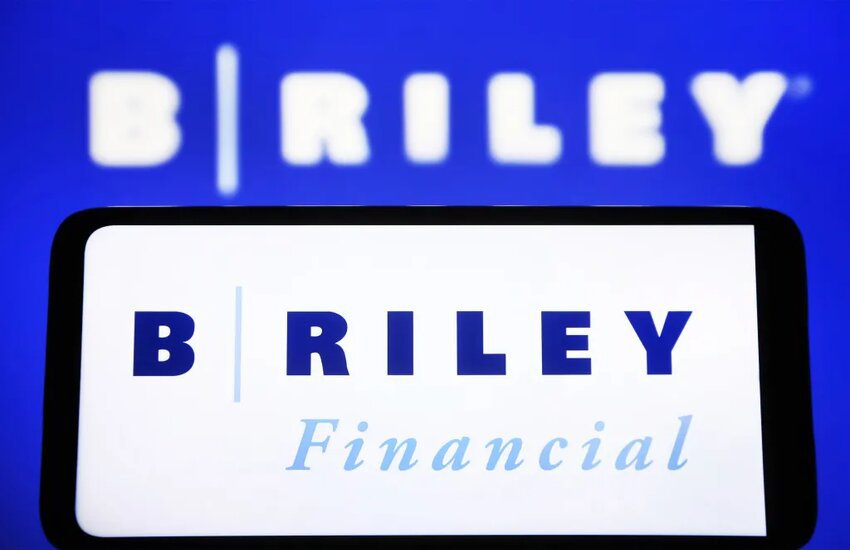B. Riley Financial (NASDAQ:RILY), once a stalwart in the financial services sector, has been grappling with a series of debilitating challenges that have significantly eroded its market value. The company’s stock has plummeted by over 76% this year, with a staggering 52% drop in just one day following the announcement of a massive second-quarter loss. The situation has been exacerbated by multiple delays in filing regulatory reports with the SEC, leading to increased scrutiny from shareholders and regulators alike. The most significant blow came with the company's investment in Franchise Group, which resulted in a markdown of $330 million to $370 million due to the rapid deterioration in consumer spending and the subsequent bankruptcy of Conn's, a subsidiary of Franchise Group. This series of events has culminated in a crisis of confidence, with short interest in B. Riley's stock skyrocketing and the company's management coming under fire. In this context, Bryant Riley, the company’s founder, has stepped in with a buyout offer of $7 per share, a move that is as much about salvaging the remnants of the company's value as it is about taking control of its troubled future. But what exactly drove Bryant Riley to make this bold move? Let us find out!
Mounting Losses and Impairment Charges
The most immediate and visible factor prompting Bryant Riley's buyout bid is the alarming financial losses and impairment charges that have plagued B. Riley in recent quarters. The company reported a net loss in the range of $435 million to $475 million for the second quarter alone, a stark contrast to the $44 million profit reported a year earlier. This loss was primarily driven by a non-cash write-down of $330 million to $370 million on its investment in the Franchise Group, which has faced significant operational challenges and is now embroiled in controversy due to the alleged misconduct of its former CEO. This loss was further compounded by a $28 million non-cash impairment charge related to Targus and a $25 million charge related to a deferred tax benefit. These impairments have not only decimated the company's profitability but have also severely impacted its balance sheet, pushing it outside its preferred leverage ratio range and forcing management to suspend dividends in an effort to conserve cash and retire debt. For Bryant Riley, these mounting losses and the associated financial instability have created a scenario where the only viable path forward is to take the company private, allowing for a more controlled restructuring process away from the harsh scrutiny of public markets.
Regulatory Scrutiny and Legal Challenges
B. Riley’s troubles have not been confined to its financial performance; the company is also facing increasing regulatory scrutiny and legal challenges, which have further eroded investor confidence. In July, B. Riley and its CEO were issued subpoenas by the SEC in connection with the company's dealings with Franchise Group's former CEO, Brian Kahn, who is under investigation for securities fraud. Although B. Riley has conducted its internal investigation, which cleared the firm of any wrongdoing, the ongoing regulatory scrutiny has created a cloud of uncertainty that has been difficult for the company to shake off. The delayed SEC filings have only added fuel to the fire, as investors are left questioning the integrity of the company’s financial reporting. This scrutiny has contributed to the sharp increase in short interest in B. Riley's stock, which peaked at nearly 80% of the float in March and remains at elevated levels. In this environment, where legal and regulatory risks loom large, Bryant Riley likely views the buyout as a means of shielding the company from further damage in the public eye. By taking B. Riley private, he can manage these challenges more discreetly and work on restoring the company’s reputation without the constant pressure from shareholders and the media.
Strategic Realignment and Focus on Core Businesses
Despite the significant challenges B. Riley faces, Bryant Riley's buyout bid is also motivated by a belief in the company's long-term potential, particularly in its core financial services businesses. Over the years, B. Riley has expanded its operations into various sectors, including investment banking, asset management, and consulting, through a series of acquisitions. However, the rapid expansion has also stretched the company thin, leading to underperformance in several areas. In response to the current crisis, management has already begun a strategic realignment, focusing on its core financial services, which continue to generate steady cash flow. This includes a renewed focus on its asset appraisal and asset disposition businesses under the Great American Group, which generated $153 million in revenue and $35 million in operating income in the last fiscal year. Additionally, B. Riley has been actively growing its advisory services and wealth management businesses, which have shown promising signs of recovery and profitability. By taking the company private, Bryant Riley can accelerate this strategic realignment, divesting non-core assets, and concentrating resources on the businesses that offer the best prospects for long-term growth. This focused approach could help stabilize the company and position it for a potential return to the public markets once the turnaround is complete.
Conclusion
Source: Yahoo Finance
The challenges facing B. Riley Financial have been severe and multifaceted, ranging from significant financial losses and impairment charges to intense regulatory scrutiny and legal challenges. These issues have not only decimated the company's market value, as shown in the above chart, but have also created a crisis of confidence among investors. In this context, Bryant Riley's decision to pursue a buyout is not just a rescue mission; it is a strategic move aimed at regaining control of the company's future. By taking B. Riley private, Riley intends to navigate the company through its current troubles with a focus on stabilizing its core businesses and ultimately restoring value. While the road ahead is fraught with challenges, the buyout represents a crucial step in the company's efforts to turn the tide and rebuild its foundation away from the pressures of the public markets.

